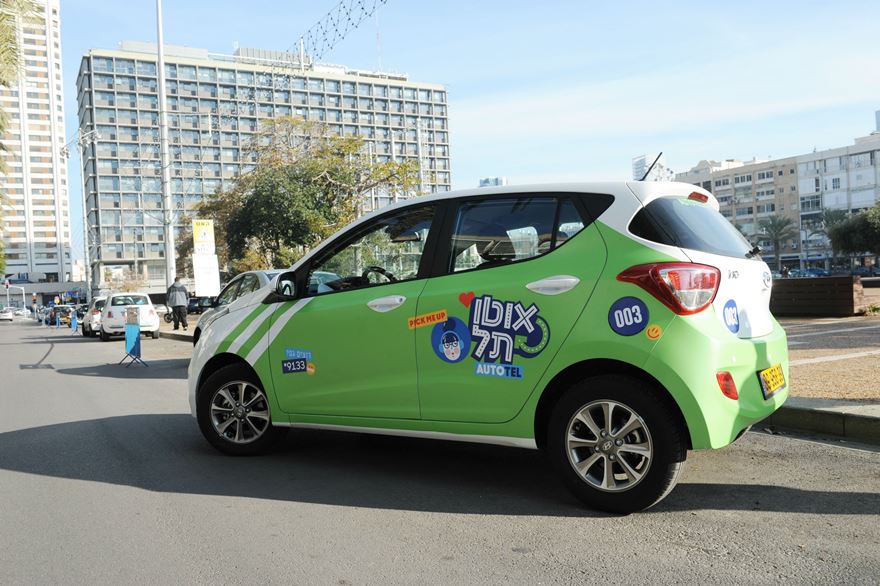Auto Tel, a new car-sharing service operated by Israeli company Car2Go, began the implementation of its $26 million city-wide initiative in July, by distributing 170 vehicles throughout the city of Tel Aviv. Tel Aviv is the first town in Israel to kick off a shared vehicle program, which is intended to reduce traffic and air pollution in the crowded metropolis.
The city of Tel Aviv has already allocated at least 340 parking spaces for drivers using the service. Many are in some of the most in-demand parking spots of the city, including next to popular shopping malls, grocery stores and trendy restaurants.
Auto Tel gives registered subscribers the opportunity to book a car 15 minutes in advance, through a smartphone app. Drivers pay $0.42 for each minute of use. They are asked to register and provide background information in order to book a vehicle. Subscriber fees will go into effect in October, but will not exceed $14 a month.
Registered subscribers receive a smart card which can be used to unlock a nearby vehicle by swiping the card through a slot on the car’s windshield.
Tel Aviv mayor Ron Huldai supports the initiative but expects protests from city residents who will lose curbside parking.
“The age of private cars is coming to an end, “he told Haaretz. “There isn’t enough room on the road for all these egotistical vehicles. The solution is only public and shared transportation.”
The popularity of car-sharing
SEE ALSO: Tel Aviv Revolutionizes Transportation With New $26 Million Car-Sharing Service
Back in January at the press conference for the launch of AutoTel, Israel’s Car2Go CEO Gil Laser called car-sharing a “transportation revolution.”
“With 5 million people around the globe already using car-sharing systems, we know that car ownership rates could drop by 20-30 percent,” he added.
Calling it “new value in the mobility space,” car-sharing innovators say that car-sharing gives households the ability to own only one car instead of two or three, and some to resist car ownership altogether. In fact, the US has seen stats proving this is already happening. In 2009, the New York Times reported that surveys on college campuses showed that 20 percent of drivers who use car-sharing services have given up their first or vehicle and 40 percent were dissuaded from buying a car at all.
Car-Sharing in the US
Sign up for our free weekly newsletter
SubscribeThere are many reasons for the success of car-sharing in the US, including environmental benefits and a decrease in traffic. But the biggest appeal of car-sharing may just be the one mentioned above – the reduction in car ownership costs.
SEE ALSO: Can Israel Lead The Way on The Sharing Economy?
The success is proven by the increase of this concept on college campuses. In 2016, American car-sharing service Zipcar conducted a national survey on the impact of car-sharing on campus, which found that car-sharing reduced the number of cars students brought by 30 percent.

Zipcar says car-sharing reduces the number of cars students bring to campus by 30 percent. Photo by Kfir Sivan for the City of Tel Aviv
Car-sharing may be taking over car ownership but in the US it is also taking over public transportation, which already seems to be on the decline in various cities.
According to Lisa Jerram, one of the authors of a 2014 Navigant Research report, “The US has fewer cities than Europe with comprehensive public transit services, which is usually — but not always — a condition for successful car-sharing.”
Car-sharing around the world
As of 2014, there were more than 40 car-sharing companies around the world, with more than 2.4 million members. Navigant Research says this will increase to more than 12 million by 2020.
In July 2017, the Israeli-founded Car2Go service became the largest car-sharing company in the world, with more than 2.5 million members registered for the service. They have more than 14,000 vehicles in 26 locations in North America, Europe, and Asia. American car-sharing company Zipcar trails behind with 767,000 members and 11,000 vehicles.
Revenue from global car-sharing programs is expected to grow from $1.1 billion in 2015 to $6.5 billion in 2024. While car-sharing is popular in Europe and North America, the Asia Pacific region has the largest share at 34 percent, because of its room for growth, according to Navigant. The Middle East, on the other hand, is said to “lag behind” in this industry.
Photos and Video: Kfir Sivan for the City of Tel Aviv, David Shay
Related posts

Editors’ & Readers’ Choice: 10 Favorite NoCamels Articles

Forward Facing: What Does The Future Hold For Israeli High-Tech?

Impact Innovation: Israeli Startups That Could Shape Our Future





Facebook comments